By Paul Comben
Of Little Ships, Long Queues and the Luftwaffe in…
“A Spoiled Victory: Dunkirk 1940”
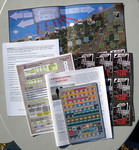 According to some, this is where Hitler lost the war. It may hardly have seemed so at the time, with the rout of France about to be completed and the British forces in utter disarray; but thanks to the Germans coming up short at Dunkirk, they would not get a chance to fight the principle elements of the British army until it was pushing through the Normandy countryside four years later. German failure at Dunkirk would eventually mean a two front war, supplemented by a massive day and night bombing campaign and the feeding of the Soviet Union’s overwhelming onslaught against the earlier Nazi conquests.And it all started with a mess of an army making a stand among the ditches and dunes of northern France, whilst Goring’s Luftwaffe got its first taste of an air force that could fight back, and the streets of Kent and Sussex were filled with old men in armbands waiting for their turn to have the rifle.
According to some, this is where Hitler lost the war. It may hardly have seemed so at the time, with the rout of France about to be completed and the British forces in utter disarray; but thanks to the Germans coming up short at Dunkirk, they would not get a chance to fight the principle elements of the British army until it was pushing through the Normandy countryside four years later. German failure at Dunkirk would eventually mean a two front war, supplemented by a massive day and night bombing campaign and the feeding of the Soviet Union’s overwhelming onslaught against the earlier Nazi conquests.And it all started with a mess of an army making a stand among the ditches and dunes of northern France, whilst Goring’s Luftwaffe got its first taste of an air force that could fight back, and the streets of Kent and Sussex were filled with old men in armbands waiting for their turn to have the rifle.
In ASV, Hermann Luttman and Paul Fish presents us with a solitaire design that aims to tell its story by having the player trying to do two very different things at the same time – leave, and hang around a bit. The game can only be won if enough Allied forces are taken off the beaches of Dunkirk by the rescuing forces – in reality, mainly naval ships, although the legend of the day understandably concentrates on the stubborn resolution of the little ships that made the crossing to France. The story is related by the resolution of combat and maneuver on the map; and this is linked to a deck of event cards that provide the ambiance for each game turn.
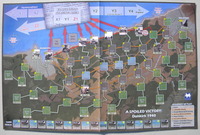 The map covers the area around Dunkirk, with approaches to the beaches and the port divided into tracks upon which the Allies must form their perimeter against the German assault. Also featured on the play surface are the evacuation routes, the sequence of play, and the turn record – each turn being either a day or night period.
The map covers the area around Dunkirk, with approaches to the beaches and the port divided into tracks upon which the Allies must form their perimeter against the German assault. Also featured on the play surface are the evacuation routes, the sequence of play, and the turn record – each turn being either a day or night period.
Units, which are presented in attractive designs, (though personally I could have done with thinner units and thicker event cards) represent divisions, remnants and the general military flotsam and jetsam that need to be elsewhere before time runs out. The cards carry a considerable amount of information/instruction, but do so with clarity. The upper part of the card will carry the “story” event for that turn, which draw on the historical narrative to colour the shape of that day in the game. These events tend either to help or hinder the defence and evacuation effort to varying degrees, and may effect the entire combat area, or just a specific part of it. Below this are four banded instruction area, detailing Luftwaffe priorities for the turn, the German forces to move, the number of actions the player gets, and, depending on whether this is a day or a night turn, the level of evacuation effort.
 Combat itself is somewhat akin to a bucket of dice system, albeit with a smaller bucket (dice are rolled equaling the combat strength of the unit) and the results being determined on winning (larger) and equal scores (compared to the defender’s combat strength) rather than the usual process of how many sixes are rolled. This can take a bit of getting used to, but it does work rather more variety and story into the fight than simply hitting or missing. German and Allied combats are resolved off different tables, which reflect the far greater resource of the Germans to keep hammering away, whereas the Allied attacks are invariably spoilers carried out with limited means for limited objectives. Major German success can seriously unravel a line; whereas for the Allies, the main objective to is throw the biggest spanner into the Blitzkrieg works that you can.
Combat itself is somewhat akin to a bucket of dice system, albeit with a smaller bucket (dice are rolled equaling the combat strength of the unit) and the results being determined on winning (larger) and equal scores (compared to the defender’s combat strength) rather than the usual process of how many sixes are rolled. This can take a bit of getting used to, but it does work rather more variety and story into the fight than simply hitting or missing. German and Allied combats are resolved off different tables, which reflect the far greater resource of the Germans to keep hammering away, whereas the Allied attacks are invariably spoilers carried out with limited means for limited objectives. Major German success can seriously unravel a line; whereas for the Allies, the main objective to is throw the biggest spanner into the Blitzkrieg works that you can.
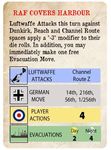 For the player, what this all boils down to is managing the scale and pace of your inevitable defeat. You are defending a tight perimeter with no room for shifting stuff around much, and precious little of worth to move around anyway. With, for my money, a certain similarity to a game like Turning Point Stalingrad, you have to defend, trade space and time and casualties in manageable portions, and then hope than the last ferry to Dover is carrying more soldiers than it is crew.
For the player, what this all boils down to is managing the scale and pace of your inevitable defeat. You are defending a tight perimeter with no room for shifting stuff around much, and precious little of worth to move around anyway. With, for my money, a certain similarity to a game like Turning Point Stalingrad, you have to defend, trade space and time and casualties in manageable portions, and then hope than the last ferry to Dover is carrying more soldiers than it is crew.
As for the sea trip, simply lifting the lads on board is not the end of the story – the evacuation routes vary in length and when they can be employed, and with dismal inevitably, the Luftwaffe is bound to take an interest in what is going on below.
What you will get out of this design largely means, like the British of eighty years ago, limiting your expectations to achievable ends. The story is very well presented, and does perform that essential duty of presenting history as an unfolding series of chapters rather than a gratuitous smattering of colour. Probably the main challenge for the player is learning how to read the game situation in order to time the likely unfolding of events. That is not to advocate card counting, as you will ruin the story experience by any sort of looking on ahead – yes, there is a British intelligence card leading to a look at what is up next, but that is a history thing, not a loophole provision.
The game certainly has merit in the variety of event on the cards, and the attempt to mix things via the combat results. As such, the desperate defence of a shrinking perimeter is there to be experienced. On the other hand, the game is still likely to have an upper limit on the number of replays possible before it gets played out. But the game does not pretend to be anything it is not – and what it is is small but near perfectly formed. Certainly, as a solitaire design, it is entertaining and a valid treatment of the subject.
Paul Comben
Game Resources:
A Spoiled Victory: Dunkirk 1940 Page


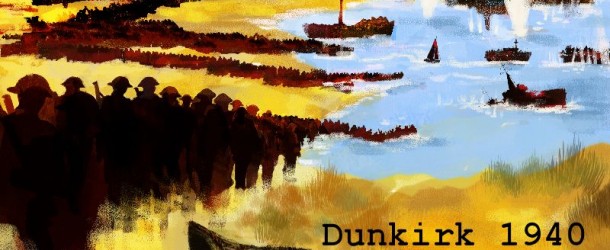
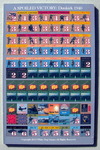
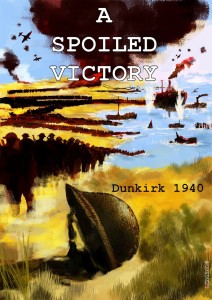
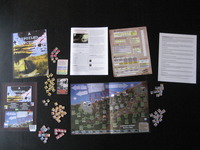
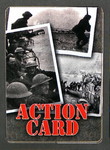






Thanks Paul! Another one of your fantastically-written pieces of prose.
Hermann